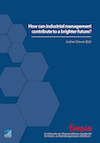Search


Bibtex
Cite as text
@Inbook{Deuse+Wagstyl+Moreno+Polikarpov+Wöstmann+Hoffmann,
Cite-key = "Deuse2023WGAB",
Year= "2023",
Volume= "Schriftenreihe der Wissenschaftlichen Gesellschaft für Arbeits- und Betriebsorganisation (WGAB) e. V.",
Pages= "167-186",
Journal = "WGAB",
Title= "Green Digital Twins in the Product Life Cycle",
Author= "Jochen Deuse (1, 2), David Wagstyl (1), Victor Hernandez Moreno (2), Mikhail Polikarpov (1), René Wöstmann (1), Florian Hoffmann (1); (1) Institute of Production Systems, TU Dortmund University;
(2) Centre for Advanced Manufacturing, University of Technology Sydney",
Doi= "https://doi.org/10.30844/wgab_2023_10",
Abstract= "Reducing emissions from industrial processes is crucial for global cli-mate protection goals. Many countries have set ambitious targets, such as Germany's goal to reduce industrial emissions by 20% before 2030. To achieve these goals, innovative technologies for sustainable industrial production are needed. Digital technologies offer opportunities to analyze energy and resource consumption, leading to data-driven improvements that contribute to climate protection. The demand for traceability solutions, including product carbon footprints and digital product passports, has increased due to EU regulations. Digital technologies have emerged as powerful enablers to meet this demand. Green Digital Twins, which optimize energy efficiency, minimize carbon emissions, and reduce environmental impact, provide a technological solution for sustainable transformation. While digital twins have gained traction in the industrial environment through standardization and demonstration activities, the technological impact throughout the product life cycle have not been adequately considered. This research paper explores how green Digital Twins contribute to sustainable industrial production throughout the product life cycle. The findings highlight opportunities and challenges in revealing emissions and constructing green Digital Twins for various purposes, thereby contributing to climate protection targets.",
Keywords= "digital twins, sustainability, product life cylce, internet of things, product carbon footprint",
}
Jochen Deuse (1, 2), David Wagstyl (1), Victor Hernandez Moreno (2), Mikhail Polikarpov (1), René Wöstmann (1), Florian Hoffmann (1); (1) Institute of Production Systems, TU Dortmund University;
(2) Centre for Advanced Manufacturing, University of Technology Sydney(2023): Green Digital Twins in the Product Life Cycle. Schriftenreihe der Wissenschaftlichen Gesellschaft für Arbeits- und Betriebsorganisation (WGAB) e. V.(2023), S. 167-186. Online: https://doi.org/10.30844/wgab_2023_10 (Abgerufen 26.07.24)
Open Access
Abstract
Abstract
Reducing emissions from industrial processes is crucial for global cli-mate protection goals. Many countries have set ambitious targets, such as Germany's goal to reduce industrial emissions by 20% before 2030. To achieve these goals, innovative technologies for sustainable industrial production are needed. Digital technologies offer opportunities to analyze energy and resource consumption, leading to data-driven improvements that contribute to climate protection. The demand for traceability solutions, including product carbon footprints and digital product passports, has increased due to EU regulations. Digital technologies have emerged as powerful enablers to meet this demand. Green Digital Twins, which optimize energy efficiency, minimize carbon emissions, and reduce environmental impact, provide a technological solution for sustainable transformation. While digital twins have gained traction in the industrial environment through standardization and demonstration activities, the technological impact throughout the product life cycle have not been adequately considered. This research paper explores how green Digital Twins contribute to sustainable industrial production throughout the product life cycle. The findings highlight opportunities and challenges in revealing emissions and constructing green Digital Twins for various purposes, thereby contributing to climate protection targets.
Keywords
Schlüsselwörter
digital twins, sustainability, product life cylce, internet of things, product carbon footprint

 English
English